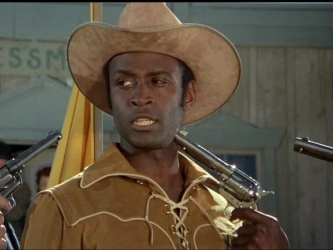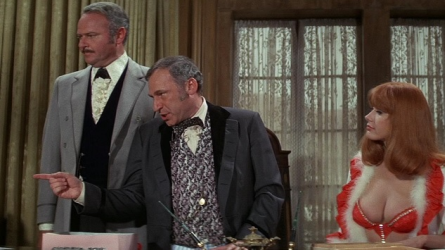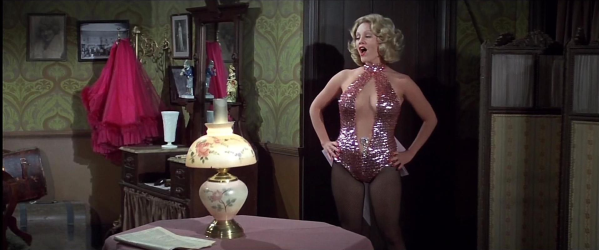I did not actually see this when it came out.* Because I was not actually Mel Brooks fan. Partly a prejudice inherited from my parents, but largely because his style of humor is very, very broad. In fact, 20 years ago, my oldest buddy—who had seen it at seven—was shocked I hadn’t and purchased a copy for me so we could all view it at home. About a half-hour in (at the campfire/beans scene), we turned it off because literally none of us were laughing.

We didn’t want the n—- to get it!
But a funny thing happened over the subsequent decades: Blazing Saddles became increasingly transgressive. With its good-natured, casual racism and less good-natured misanthropy and cynicism regarding government, I began to think the kids would never see it screen publicly in their lifetimes. Then, last year a local theater played it—but against a Marilyn Monroe double-feature—so we missed our chance. But only for a few months, as it turned out. This seems like kind of a big deal to me, that this movie can still be shown—and to a packed laughing house of, yes, millenials in, yes, one of the leftier enclaves of one of the leftiest towns.
I still wasn’t expecting to enjoy it much, and I’m happy to report that I did. We all did, in fact, though curiously, we all rank Mel’s big three (The Producers and Young Frankenstein being the other two) in different orders and none of us with this movie at the top.
The premise is classic: A town is targeted by the greedy Hedley Lamar (Harvey Korman) who wants to buy up the land before the train comes through, and the unsuspecting town needs a sheriff to defend from his evil minions. The twist, of course, is that the sheriff is sent by Lamar to drive them away—not by virtue of any bad action, but by virtue of being black. On the one hand, Walter Moses Burton might have something to say about the likelihood of this, but if there were black sheriffs in the Old West, there weren’t any in the movies about the Old West which this is parodying.

Robyn Hilton had a light movie career consisting entirely of being beautiful and busty.
When sheriff Bart (Cleavon Little) and his drunken gunslinger pal Jim (Gene Wilder) outsmart him, the evil Hedley sends out his secret weapon, Lili Von Shtupp (Madelin Khan) to seduce him. She, of course, is won over by his prowess, making this the one of at least two movies in 1974 where Khan plays a vamp who is tamed by an enormous schwanzstucker.
The humor can be broken down into a few categories. The political satire (the parts with Mel Brooks himself as Governor Lepetomane) is neither subtle nor clever, though it serves the story well enough. The use of racism is hit-and-miss. The physical comedy works best when it’s paired with absurd visuals, such as when a man (and his horse) are being hanged, and least when it’s in the pratfall/conk-on-the-head level. The anachronisms and meta-jokes are kinda cute. When the production literally breaks out of its soundstage and onto the Warner Bros. lot, that is also very hit-and-miss, but nicely winds back on itself. (Unlike, say, Monty Python and the Holy Grail, where you can feel a little cheated because you didn’t get the end of the story.)
But even when I wasn’t laughing, others were. This is the sort of movie that rewards not being easily offended or put off, because there are a lot of good gags, whatever your taste. And for all its heavy-handedness it actually never feels preachy. When your message is “racism is bad” and “politicians are corrupt and lazy”, you really don’t need to spell it out, especially if your subtext is along the line “When you can laugh at things, they’re not really that bad.” There’s also an overarching message of redemption and tolerance, suggesting that we can all live together in peace, even the Irish.

Madeline Kahn knew how to slip into something more comfortable.
Great performances from Little, Korman, Alex Karras as Mongo, with all the various Johnsons: Jonathan Hillerman (Higgins from “Magnum P.I.”), David Huddleston (the eponymous “Big Lebowski”), Liam Dunn (from Young Frankenstein) as the preacher, and so on. And these people are all dead, as is everyone in this movie except Brooks himself, Burton Gilliam (who still works and went on to be a regular on “Evening Shade”), and the lovely Robyn Hilton, whose last film role (at 44!) had her cavorting around in the most scandalous French maid outfit ever.
Wilder’s performance is outstanding. One of his best, and all done in his lilting soft-spoke voice. He doesn’t shout at all. Madeline Khan is sui generis, of course, as if her performance was never written down and she was just living it on screen for us. I didn’t care for Brooks as the governor, but there was a distinct endearing charm to Brooks as the Indian chief. (Can you say PRAH-BLAH-MATIC?)
At no point in the proceedings do you get the impression that anyone had lost the focus on making an entertaining picture. This movie uses racism (and in some pretty conventional ways) without depending on racism, which is an art lost.

These guys had the best chemistry.
*I was also too young to see it but pace Obama, nobody gave a damn in the ’70s if toddlers wandered into R-rated movies.

I’d rank them. Young Frankenstein, The Producers, Blazing Saddles. Its avVery uneven movie. Brooks, Korman, and Slim Pickens were the highlight for me. Usually Love Gene Wilder but he’s miscast in this one. IRC, Gig Young was supposed to play the role, but died.
Good review. Its hard to write about comedies because its all so subjective.
Saw this at the Alamo Drafthouse in a crowded theater and people laughed and repeated lines. Loved it just for the fun, but Young Frankenstein much better. The ending of Blazing Saddles always disappoints me.
All actors were great, but Harvey Korman is an unappreciated genius!